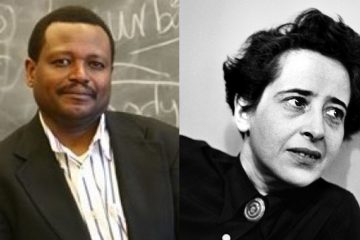The following piece was written April 18th, 2020, 11:00 – 11:05 pm. But the ideas in it have been under works for several months; the lines below represent a subset of my tentative conclusions. Thank you to several of my close friends, including Hope Kean and Oscar Mahoney, for amazing discussions and contributions to the development of my thoughts. Please find below my explication.
On Intelligence
Masako Toyoda
Pick it apart, the concept
of “what is it” between you and me.
Turn it around, and look at it
so as to, for the first time, see.
Every corner now, every crevice
each detail sparkles from new insight.
Let your mind explore the thought
for a moment longer than a luddite.
Pick it apart, the concept
of what it means for you “to be”.
Turn it around, and look at it
so as to, for the first time, see.
Every corner now, every crevice
each detail sparkles from new insight.
Let your mind explore the thought
for some time with all your appetite.
Pick it apart, the concepts
everything—anything—in actuality.
Turn it around, and look at it
so as to, for the first time, see.
Every corner now, every crevice
each detail sparkles from new insight.
Let your mind explore the thoughts
in this life with all your human might.
I think the overall structure of this piece is self-explanatory. The most necessary and telling features of intelligence are captured in the repetitive lines: the ability to look at a single concept from different angles, the ability to do so in a sustained way, and the repetition of these activities that must occur for comprehension. I use the age-old analogy of sight to make the distinction between those—everyone’s default, i.e. human existence without conscious effort to develop one’s intelligence—who merely take in perceptual input versus those who not only take in perceptual input but also grasp beyond what is immediately apparent.
The second and last lines of each stanza deliberately changes and shifts in content. The shift in the second lines expresses the sequence of what is more to less fundamental for my understanding of in what intelligence consists. The shift in the last lines expresses the psychological development of intelligence.
the Second Lines:
The second lines may seem like a topical sequence in order of value: first human relationships, second more “difficult” concepts, and third some sort of coherence or completeness. This is not what I intend to convey, though I am not very opposed to the idea.
Instead, I suggest a rough and overlapping temporal sequence. The primary set of objects upon which one’s intelligence ought to operate is that which is contained in one’s immediate surroundings, which include personal relationships (“what is it” between you and me). This happens from birth, and in “immediate surroundings” I include physical objects, laws of nature, etc. The exercise of conceptual identification and analysis on these, I of course also think, is intelligence. The latter is simply more widely acknowledged and thus less interesting to mention.
Being well-educated or informed is not coextensive with possessing intelligence; a ‘book-smart’ individual can lack intelligence in any meaningful sense of the term. One may, from external incentive or pressure, forego developing an understanding of one’s immediate surroundings and even be successful in the realms of knowledge for which we have standardized societal measures. This common phenomenon seems to be either an innate lack of intelligence or an induced one, but a lack all the same.
The motivation for this claim is my observation that many extremely intelligent people have no formal schooling. Yet they obviously possess amazing insight for the realms of knowledge to which they are privy—which, necessarily, are the most fundamental, for they are realms one cannot naturally forego—e.g. human relationships. A developed cognitive grasp on human relationships, similar to a developed cognitive grasp on quantum physics, is difficult to achieve precisely because it too is an extremely complex realm of knowledge.
As a possessor of intelligence develops an understanding of their immediate surroundings, they will, or so I suggest, also develop a cognitive grasp for the overall big picture for knowledge more generally (what it means for you “to be”). By the big picture, I mean something like the overall structure by which the world works. It does not seem to me appropriate to consider intelligent someone who can merely produce one particular thought process for one particular topic without seeing the overall structure of knowledge in which their thoughts fit. Any logical person can figure out the answer to a well-defined question, but an intelligent person should be able to do so and generate the right questions to pose.
Finally, I suggest, that the full realization, or best case scenario, of intelligence would be such that one has figured out or filled in all the details (the concepts everything—anything—in actuality) of the overall structure of knowledge they have seen and understood. This may seem like characteristic of brute force effort, but importantly I think, this effort is made possible by the presupposed grasp of the big picture. An understanding of which details are more primary than others and how they fit in relation to one another is impossible without this overall grasp. This entire developmental process—from raw intelligence to its full-fledged form—is made possible, I think, by persistant efforts.
I have suggested that the mind of the innately intelligent person, per my observations and reasoning, works repeatedly to grasp realms of knowledge in my presented sequence: 1) immediates, 2) big picture, 3) everything, the last enabled by the process of the first two. This is, or so I think, the natural sequence of input upon which we may conduct conceptual identification and analysis. It seems to me that there is empirical evidence to suggest that in some cases, not exercising one’s mind in this sequence can create irreversible (due to corresponding psychological development) roadblocks to developing intelligence in its full realization.
This is not, however, to say that I think that one who does not exercise one’s mind in this sequence could never become intelligent in the meaningful sense of the term. One may, for example, after completing an imposed, rigorous regimen to learn the details of the various natural and social sciences (developed by other people), further apply one’s mind to other realms of study. Doing so, I think, could eventually develop intelligence. In fact, it seems not unreasonable to think that this methodology may even be a fast-track in the long-term, since developing a meaningful understanding of mathematics and other sciences is an inevitable and important part of being intelligent, and it may be difficult to be able to invest the time and effort to understand these topics later in life (whereas, the thought goes, one must always interact with other people). This is a longer discussion I leave for another day.
the Last Lines:
As aforementioned, these lines express an intelligent psychological development that I believe accompanies—or even motivates—the persistent effort of a mind to exercise conceptual identification and analysis on a set of objects. “Let your mind explore the thought…”:
“…for a moment longer than a luddite”: is intended to convey my observation, or inductive generalization, that intelligent individuals seem to possess a genuine curiosity for new ideas, an open attitude for new stimuli. Combine the ability to do conceptual analysis with this psychological picture and its consequences for what one chooses to do (e.g. repeatedly put oneself in a position to be exposed to new ideas and stimuli). Being open to thoughts and experiences that you do not already have, I think, is conducive to developing a greater understanding of your surroundings, the world, and the connections between everything in it.
“…for some time with all your appetite”: is intended to convey my observation that those who start to scratch at the surface of a particular realm of knowledge (if they have any awareness, anyway) quickly come to realize that the little they understand is basically an infinitesimally small fraction of the entire field they face. For some individuals, this realization may be what makes them psychologically averse to going further. This, I think, is characteristic of a lack of intelligence. For other individuals, this realization may be what makes them even more desirous of sustained and repeated inquiry into and subsequent understanding of that and all realms of knowledge. This, I think, is characteristic of the psychology of an intelligent person. An intelligent person, I think, has an insatiable craving to understand more, partially due to their cognitive appreciation for all there is to understand.
“…thoughts in this life with all your human might.“: hmm, I am not committed to including “human” in this line, for I am not committed to the historically dominant view that human intelligence is the best there is (well, second to God’s if you believe in God) that this line may reasonably suggest. I do not mean to suggest this. Instead, my inclusion of “human” is intended to indicate my thought that each and every human mind is equipped with raw intelligence that, if only paired with the opportunity and resources to engage in repeated and sustained effort for conceptual identification and analysis, can develop into what I earlier called a full-fledged intelligence, one can always become intelligent.
[This, I realize, is an extremely optimistic view that perhaps relies too heavily on my unmentioned thoughts for the power of education; I imagine that some people would (thinking it conclusive) present me empirical evidence to refute my present and tentative understanding of human beings. I haven’t thought about this enough.]
In any case, the idea in this line is that there is something really fantastic about the abilities we have as a human being to engage cognitively with our surroundings, the greater world, and thereby understand the connections between everything in it. The idea in this line is to express my admiration for intelligence, this human power, each of our “human might“, italicized intentionally to pair with the italicized “intelligence” in the title.
The corresponding pairings of the second and last lines, too, have a deliberate meaning, but alas, I have other work to do.


